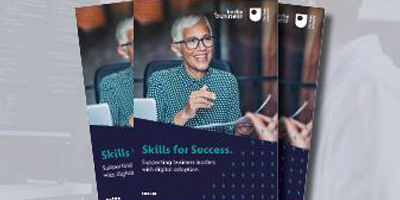IBM: Strengthening the ladder of opportunity

Chris Cocklin has one apprenticeship under his belt and is now on his second – a Digital and Technology Solutions Professional Degree Apprenticeship through The Open University (OU). And he has recently been nominated for a British Computer Society Apprentice of the Year award.
A software engineer at IBM, Chris is on what the company calls ‘the ladder of opportunity’, whereby employees are encouraged to take more than one apprenticeship to progress their learning and career trajectory.
Tackling skills challenges
Being a technology and consulting company, it is essential that IBM has a workforce equipped with both strong people skills and advanced software engineering skills. However, there is an acute shortage of digital skills in the UK, particularly in business-critical areas such as AI, cybersecurity, and data analytics. Organisations can also turn to our Digital Hub for training solutions to help close these skills gaps. This shortage highlights the software engineering challenges facing employers today.
To address these issues and acquire digital talent, IBM focuses on building a strong internal talent pipeline through its digital talent programme, particularly via apprenticeships. “Our solution is to build our own talent, to some extent,” says John Griffin, Learning and Development Leader for Early Professionals at IBM. “We can bring people in with little to no technical skills and train them.” This proactive digital talent acquisition approach also enables the organisation to reach a broader and more diverse digital talent pool.
IBM places more emphasis on a candidate’s potential and soft skills than on existing technical abilities. Software engineer skills can be developed through IBM's apprenticeship routes, where employees gain both theoretical knowledge and practical experience.
“They can immediately apply what they’re learning on the apprenticeship and see how it actually works in business,” says John. This hands-on model is a key feature of IBM’s digital talent program, helping address software engineer challenges while supporting long-term workforce growth.
To view subtitles, please click the subtitles icon. You can also download a transcript here.
Enabling the ladder of opportunity
IBM and The Open University have an established partnership going back several years, with the OU offering several apprenticeship pathways to IBM employees, such as the Digital and Technology Solutions Professional Degree Apprenticeship. These programmes are a key part of IBM’s broader digital talent programme. “The OU plays a key part in that ladder of opportunity,” says John.
Chris joined IBM on a software Level 4 apprenticeship in 2019. He had achieved three ALevels at college, but didn’t quite get the grades he wanted, so he went travelling for a year around Australia. When he returned, he decided against the traditional university route and applied for the IBM apprenticeship programme instead. He was drawn by the opportunity to earn while learning, with tuition costs covered via the apprenticeship levy, a model that aligns with IBM’s strategy to acquire digital talent and develop software engineering skills internally.
Since then, Chris’s career has progressed rapidly. He has transitioned to a new area of the business, earned a promotion, submitted several patents, taken on more responsibility, and now mentors new colleagues. In September 2022, he began his degree-level apprenticeship with the OU. “Just like the first apprenticeship, it seemed like such a good deal to me,” he says. “You get a full salary, at least one day off a week to work on the apprenticeship, and you learn all these different technologies that you wouldn’t normally be exposed to in your day role.” The programme not only helps build core digital skills but also addresses real-world software engineering challenges, giving apprentices like Chris the chance to thrive.
Broadening horizons
In his role as a software engineer, Chris does regular coding and testing work, but he wanted the opportunity to learn about areas such as web technologies and project management. Through this second apprenticeship, he is learning a variety of new skills that will help him take the next steps in his career.
It’s a guaranteed way to broaden your knowledge, see what resonates with you and what you enjoy doing. That appealed to me. It also gives you a lot of confidence in your organisation and time management skills
Chris Cocklin
Software Engineer and apprentice, IBM
Alongside other OU apprentices, Chris also shared his experiences at the OU campus with Robert Halfon MP and OU Vice Chancellor, Tim Blackman.
The importance of flexibility

Chris chose to study through the OU rather than one of the other providers offered by IBM largely because of the high level of flexibility. “It makes it a lot easier because you can fit the study in around the rest of your working week. Also, I wasn’t sure where I was going to be permanently living so remote learning gave me a bit of freedom as to where I wanted to be.”
Jane Dickinson, Digital Skills Lead at the OU, thinks this flexibility will be increasingly important in today’s hybrid world. “More and more companies are operating hybrid models and I think it fits really well with that, on top of the flexibility of not having to engage in block release or day release.”
Added benefits
The OU has a credits system whereby it acknowledges any relevant learning that students have already undertaken. This also appealed to Chris as it meant he could apply his credits to the first two modules on the programme. Throughout his experience of the OU, Chris has been impressed by the quality and speed of the support offered. “You get a learning mentor to support you for the whole apprenticeship, you get your module tutors and you get forums. I’ve never had a question that I couldn’t get answered in less than a week.”
John agrees with Chris that the success of the OU apprenticeships is partly due to the high level of support, as well as the quality of the learning content. IBM and the OU are in regular contact to ensure all apprentices are happy and thriving on their courses.
A proven track record
IBM has an apprenticeship completion rate of over 90%, which John says is well above the national average. In fact, the apprenticeship are so popular that when the company opened applications to its latest round of Digital and Technology Solutions Professional Degree Apprenticeships during National Apprenticeship Week, it had to close applications on the same day – on reaching the target number of applicants.
If your organisation is interested in partnering in a similar way with the OU, please get in touch here:
You might also like...
Please contact us to speak to one of our business team advisors.
Not on our mailing list?
Sign up to receive regular emails that are full of advice and resources to support staff development in your organisation.


